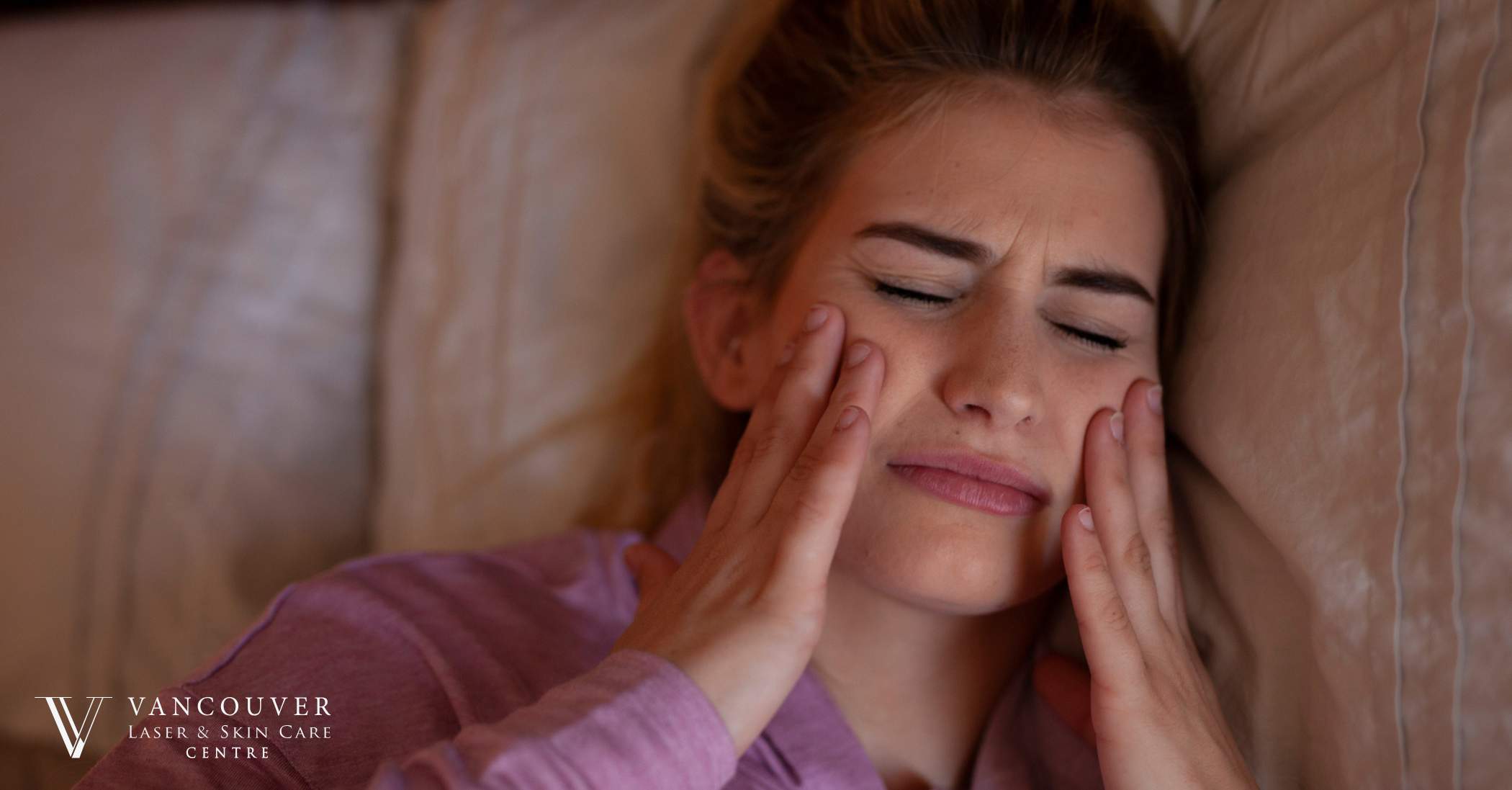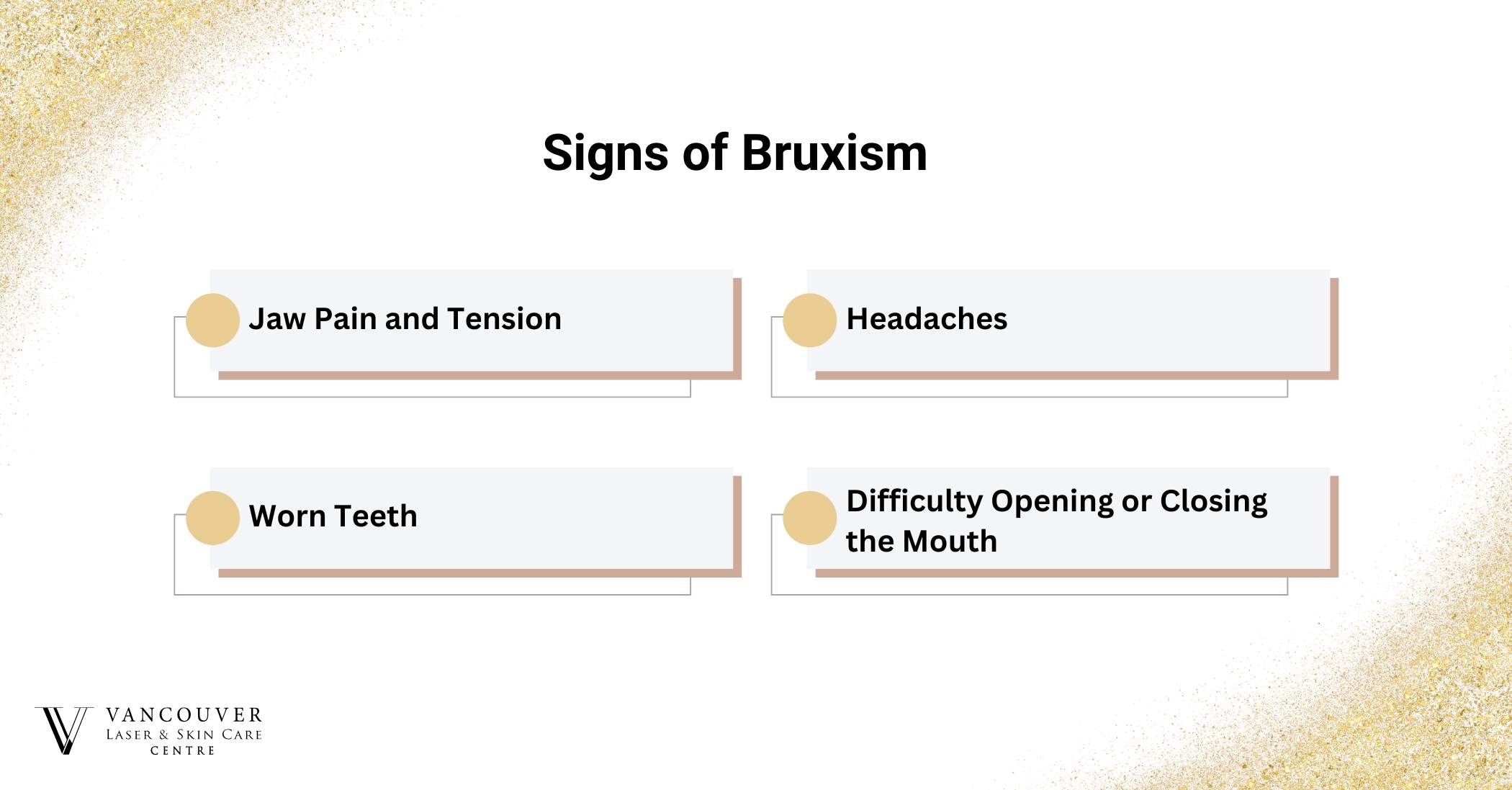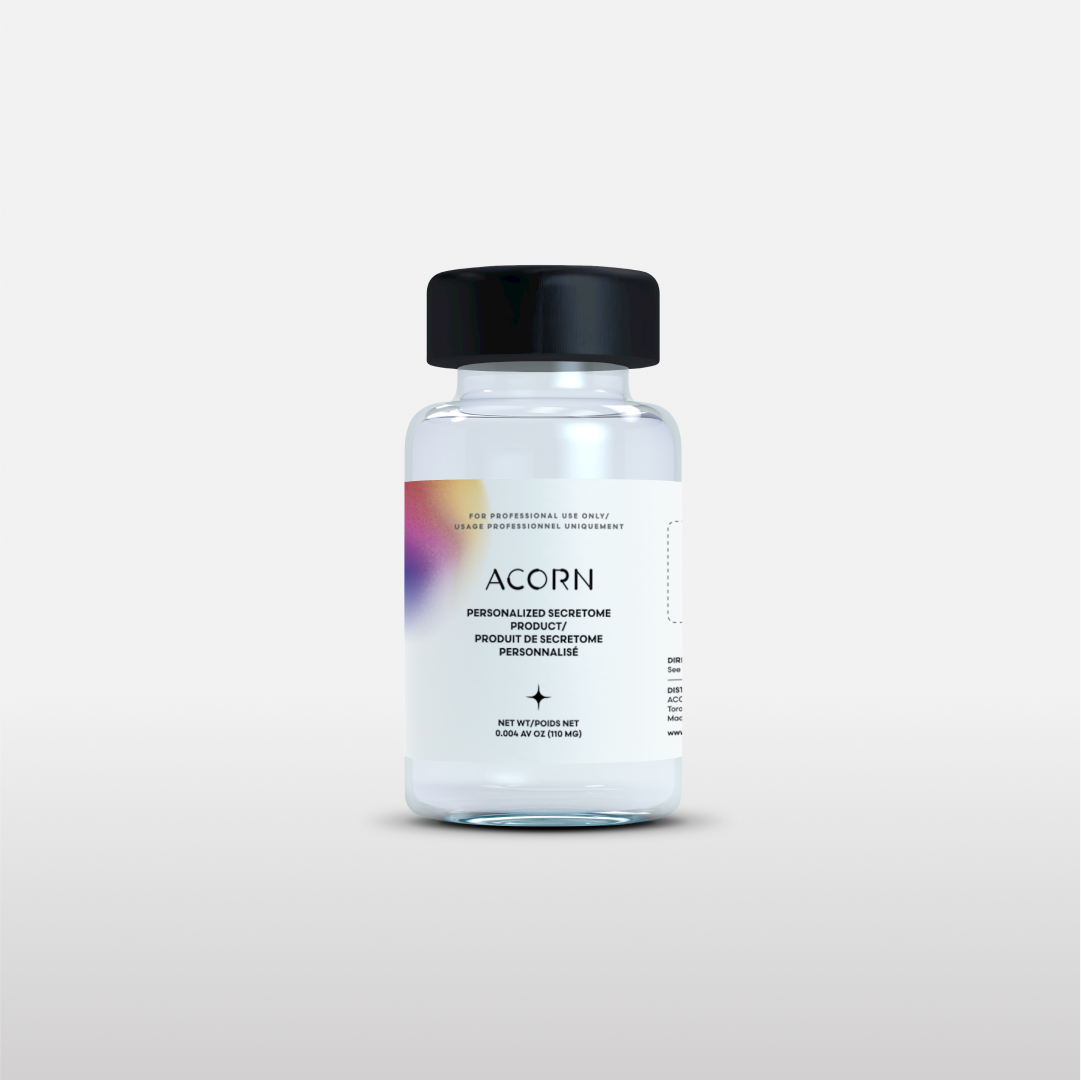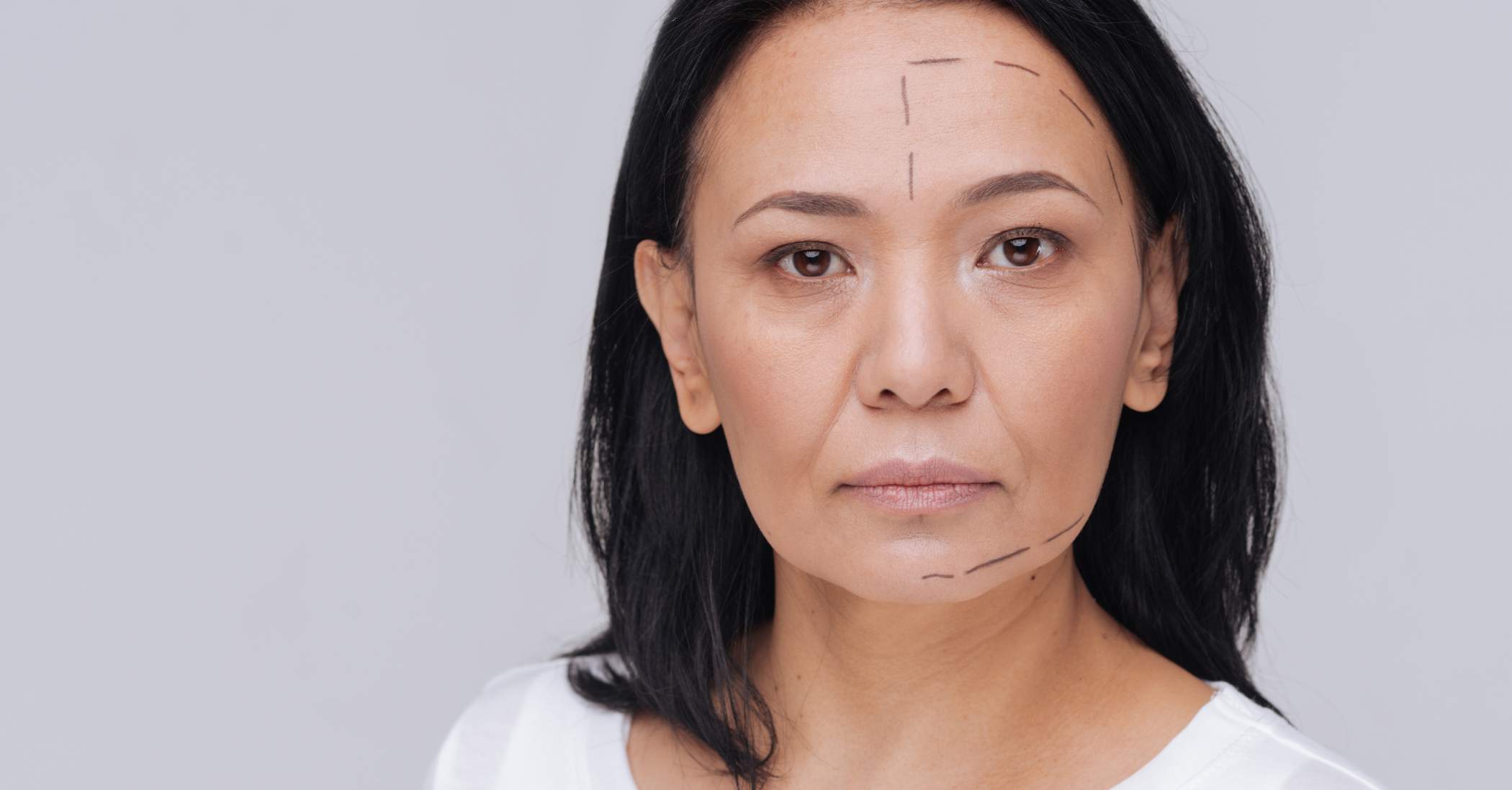Teeth grinding, also known as bruxism, affects millions of people, often without their awareness. This condition involves clenching or grinding teeth, which can lead to jaw pain, headaches, and significant damage to teeth and oral health if left untreated. Bruxism can occur both during the day (awake bruxism) and at night (sleep bruxism), impacting daily comfort and overall well-being.
At Vancouver Laser & Skin Care Centre, we understand the challenges bruxism presents. With over 27 years of expertise in medical aesthetics and functional medicine, we offer effective treatments such as Botox to relax jaw muscles, alleviating tension and reducing symptoms. Our holistic approach prioritizes restoring comfort and function for a better quality of life.
In this guide, we’ll explore the causes, treatments, and prevention strategies for bruxism, empowering you to take control of your oral health and achieve a healthier, pain-free smile.
Understanding Teeth Grinding (Bruxism)
Bruxism is the medical term for grinding, clenching, or gnashing teeth, often done unconsciously. It can occur during the day (awake bruxism) or at night (sleep bruxism). While occasional grinding may not pose significant harm, frequent or severe bruxism can lead to serious dental and health issues.
Differences Between Awake and Sleep Bruxism
- Awake Bruxism: Often linked to stress, anxiety, or intense focus, awake bruxism occurs when individuals consciously clench their jaws or grind their teeth during the day. It commonly happens during periods of concentration or emotional distress.
- Sleep Bruxism: This involuntary condition occurs during sleep and is classified as a movement disorder. Many individuals remain unaware of their grinding until symptoms like jaw pain arise or a partner observes it. Sleep bruxism is often associated with other sleep disorders, such as sleep apnea.
How Bruxism Affects Dental Health, Jaw Alignment, and Overall Well-Being
Chronic teeth grinding can lead to:
Damage to Teeth: Enamel wear, increased sensitivity, chipped teeth, or even tooth loss. It can also compromise dental restorations, such as crowns or fillings.
Jaw Strain and Appearance Changes: The excessive pressure from grinding overworks the jaw muscles, especially the masseter muscles, potentially causing Temporomandibular Joint (TMJ) dysfunction. This condition may result in jaw pain, restricted movement, and clicking sounds. Additionally, overdeveloped masseter muscles can create a square or more masculine jawline.
At Vancouver Laser, we offer customized treatments, including Masseter Botox for bruxism, which alleviates jaw tension, reduces discomfort, and slims the jawline by relaxing overactive muscles.
Impact Overall Health: Beyond dental concerns, bruxism can cause headaches, earaches, neck and shoulder tension, and disrupted sleep, all of which can reduce productivity and quality of life.
By understanding bruxism, you can take proactive steps to manage its causes and minimize its effects. At Vancouver Laser, we provide tailored teeth grinding & clenching treatments such as Botox for bruxism, helping to restore comfort and improve function.

What causes teeth grinding?
Teeth grinding, or bruxism, can result from various factors, including mood, behavior, medical conditions, family history, and medication use. Experts classify bruxism into two types: primary and secondary.
Primary Bruxism
Primary bruxism is not associated with any underlying medical condition. Common causes include:
- Stress or Depression: Emotional strain often triggers teeth grinding.
- Personality Traits: Tense, angry, or competitive personalities are more prone to bruxism.
- Family History: A genetic predisposition can increase the likelihood of developing bruxism.
- Lifestyle Factors:
- Caffeine Intake: Excessive consumption can heighten the risk.
- Alcohol Consumption: Known to exacerbate grinding tendencies.
- Smoking: A contributing factor to bruxism.
Secondary Bruxism
Secondary bruxism occurs due to medical conditions or medication side effects. Causes include:
- Neurological Conditions: Disorders like encephalitis, brain hemorrhage, traumatic brain injury, or stroke can lead to bruxism.
- Medications: Certain drugs, including:
- Antidepressants (e.g., Prozac, Paxil).
- Anti-Seizure Medications.
- ADHD Medications.
- Neurotransmitter Imbalances: Irregularities in brain chemicals that facilitate nerve cell communication can trigger bruxism.
What are common signs of bruxism?
Bruxism often goes unnoticed until it causes pain or damage. Watch for these key symptoms:

Jaw Pain and Tension
A persistent ache or tightness in the jaw muscles is a hallmark of bruxism. You might also experience soreness in your face or around your ears.
Headaches
Bruxism often leads to dull headaches, especially in the temples, caused by muscle strain from clenching or grinding.
Worn Teeth
Over time, bruxism can flatten, chip, or fracture teeth. Increased sensitivity may occur as enamel wears away, exposing the softer layer beneath.
Difficulty Opening or Closing the Mouth
Grinding can strain the temporomandibular joint (TMJ), restricting jaw movement. Clicking or popping sounds may occur when you open or close your mouth.
How is bruxism diagnosed?
Early identification of bruxism is essential to avoid long-term dental and health complications.
Dentists evaluate physical symptoms such as enamel wear and jaw tenderness, while sleep studies can detect nocturnal grinding and associated sleep disorders.
Professional Evaluation by Dentists
Dentists play a vital role in diagnosing bruxism. During an exam, they look for key indicators like enamel wear, tooth damage, or jaw tenderness.
They may also inquire about symptoms such as morning headaches, jaw pain, or disrupted sleep. In some cases, X-rays are recommended to identify structural issues caused by grinding.
Role of Sleep Studies for Nocturnal Bruxism
Sleep bruxism often occurs unconsciously during sleep, making it difficult to identify without specialized assessments. Sleep studies, conducted in clinics or using home-monitoring devices, can detect grinding episodes and related sleep disturbances. These studies are particularly useful in diagnosing bruxism associated with conditions like sleep apnea.

When to Seek Professional Help
Untreated bruxism can lead to significant pain and long-term dental issues. It’s essential to seek professional assistance if you notice any of the following signs:
- Persistent jaw tension, soreness, or toothaches, which may indicate that grinding is causing harm to your teeth.
- Signs of worn enamel, chipped or cracked teeth, or heightened sensitivity, all of which are strong indicators of bruxism.
- Sleep disturbances, such as feeling fatigued despite rest, which could be linked to grinding or associated conditions like sleep apnea.
Addressing these symptoms early can prevent further damage and improve your overall well-being. At Vancouver Laser & Skin Care Centre, we offer effective treatments, including Botox, to relieve jaw tension, reduce grinding, and enhance comfort. Schedule a consultation today to take the first step toward better oral health and improved quality of life.
What are the best treatments for bruxism?
Managing bruxism effectively requires a combination of dental, medical, and therapeutic methods to alleviate symptoms and prevent further damage. Here’s an overview of the most effective treatments:
Custom Mouthguards or Splints
Dentists often recommend custom-made mouthguards or splints to protect teeth from grinding. These devices are designed to fit your bite, reducing jaw pressure and minimizing tooth damage during clenching or grinding.
Dental Corrections
For individuals whose teeth grinding (bruxism) stems from dental misalignment, treatments such as braces, crowns, or teeth reshaping can help correct the bite and reduce grinding.
At Vancouver Laser, we specialize in Botox injections for bruxism, providing relief by relaxing the jaw muscles and preventing further discomfort.
For structural dental solutions, we recommend consulting a qualified dentist or orthodontist, who can address the root cause of the issue for lasting results.
Botox Injections
Botox injections are an effective solution for teeth grinding (bruxism). By relaxing overactive jaw muscles, Botox reduces clenching and grinding, alleviating jaw tension and discomfort. This non-invasive treatment delivers lasting results with minimal downtime.
At Vancouver Laser, our treatments typically involve 10-50 units per side, with effects lasting approximately 3-6 months. Please note, we do not direct bill insurance. Clients must submit their receipts independently for reimbursement if coverage applies.
Medications
Doctors may prescribe medications to address bruxism-related issues such as pain, stress, or sleep disorders. These can complement other treatments to improve overall outcomes.
Behavioral Therapy
Breaking habits that contribute to bruxism, such as chewing on objects or clenching during stressful situations, can significantly reduce grinding. Behavioral therapy offers strategies to identify and change these triggers.
Stress Management Techniques
Relaxation practices like mindfulness, meditation, or yoga are effective in managing stress—a common cause of bruxism. These techniques help relax jaw muscles and can be combined with professional treatments for a comprehensive approach to bruxism management.
By combining these treatments, individuals can achieve better control over bruxism and protect their oral health. At Vancouver Laser, we offer personalized solutions to address the unique needs of each patient, ensuring lasting relief from the effects of teeth grinding.
Teeth Grinding Prevention Tips
Proactively addressing teeth grinding can significantly improve your oral health and overall well-being. Here are some practical strategies to prevent bruxism:
Reduce Stress
Stress is a common cause of teeth grinding. Incorporate relaxation practices such as meditation, deep breathing, or yoga into your routine. These techniques can calm your mind and help relax your jaw muscles, reducing the likelihood of clenching or grinding.
Improve Sleep Habits
Establish a consistent sleep schedule by going to bed and waking up at the same time each day. Quality sleep can minimize nighttime grinding. Avoid caffeine and alcohol in the evening, as these substances can disrupt sleep and exacerbate bruxism.
Do Jaw Exercises
Perform simple jaw exercises to strengthen and relax your jaw muscles. Massaging your jawline or applying a warm compress before bed can further alleviate tension and decrease grinding.
Change Your Lifestyle
Identify and avoid habits that contribute to bruxism, such as chewing on pens or gum. Be mindful of clenching your jaw during stress, and take regular breaks to relax your facial muscles during intense work or concentration.
Conclusion
Bruxism can lead to significant dental and health complications if left untreated. Identifying symptoms early and understanding available treatments are crucial steps to safeguarding your oral health and overall well-being.
At Vancouver Laser & Skin Care Centre, we specialize in effective, personalized solutions for teeth grinding, combining advanced medical and therapeutic methods like Botox to alleviate jaw clenching and grinding.
Our dedicated team ensures every patient receives a tailored treatment plan designed to reduce discomfort and prevent further damage.
Take control of your health and comfort today. Schedule a consultation at Vancouver Laser & Skin Care Centre and explore customized bruxism treatments to start your journey toward a healthier, pain-free smile.
FAQs
1. How can I stop grinding my teeth naturally?
You can reduce teeth grinding by managing stress, practising good sleep hygiene, and using relaxation techniques like jaw massages and exercises.
2. Is teeth grinding harmful?
Yes, it can lead to jaw pain, headaches, tooth damage, and long-term oral health problems if untreated.
3. Does stress cause teeth grinding?
Yes, stress and anxiety are common triggers for teeth grinding, particularly during waking hours.
4. What are the most effective treatments for bruxism?
Effective treatments include custom mouthguards, Botox injections, stress management techniques, and behavioural therapy to address underlying causes.



